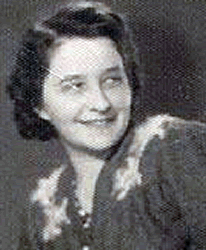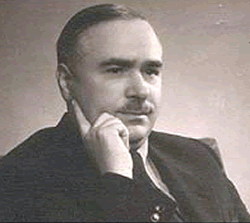

Ludwik Zurowski and his wife; Maria Zurowska
Ania Lichtarowicz tells the story of her grandfather who saved Jews in
the ghetto in Krakow during World War II.
BBC News Online's
A five-year-old girl looks out of her parents' apartment window and
sees a young Jewish woman walking along the street carrying her baby.
Suddenly a Nazi soldier grabs the baby by its legs and starts hitting
the baby's head against the wall enclosing the Krakow ghetto.
He does not stop until the baby's brains and blood are splattered over
the wall.
This is one of my mother's earliest childhood memories, and the
screams of the child's own mother haunt her to this day.
But other memories of that time, and how my grandfather helped the
Jews during some of the worst days of their history, she tells with
pride.
Freedom of movement
My grandfather, Dr Ludwik Zurowski, was Krakow's medical officer.
He was kept on by the Nazis because he was fluent in German.
His role was to stop diseases spreading among the Polish and Jewish
workforce.
My grandmother, Maria Zurowska, would make food for the Jews
This position allowed him to move freely around the city. He could
even walk into the ghetto whenever he wanted.
And it was this privilege that he exploited to smuggle in hair dye,
made by Polish pharmacist Tadeusz Pankiewicz, to help "rejuvenate" the
Jews.
Once their hair started turning grey, the Nazis no longer considered
them useful and so would transport them to concentration camps.
My grandmother, Maria Zurowska, would spend her nights melting fats
and sugars into medicine bottles so my grandfather could give them to
the Jews.
Fictitious disease
Apart from helping Jews in the ghetto, he was responsible for the
health of workers in a major ammunition factory in Krakow.
He concocted a story, telling the German factory director he was
seriously concerned about the spread of a fictitious disease amongst
the workforce which he was unfamiliar with.
Alleging it was unique to the Jewish population, he specified that the
help of a Jewish doctor was essential otherwise he would not take
responsibility for any disease outbreaks.
The factory director, fearing he would be shot if production stopped,
agreed.
My grandfather picked Dr Biberstein from the factory workforce - his
former boss - and together they held regular surgeries in the factory,
feeding and treating the Jewish workforce.
Suspicions
My grandfather also acted as a courier between Jews - helping families
to stay in touch - and although often questioned by the Nazis, he was
never caught.
But they had their suspicions.
After he helped a young Jewish woman, who was dying of breast cancer,
escape under false papers, some of his prescriptions were found in her
baggage when she fled from a train that was being boarded by Germans.
The morphine he prescribed to ease her pain and "let her die with
dignity", as he later told, was to cost him dearly.
Whilst being interrogated by the Gestapo he had each of his teeth
pulled out - one by one - but he continued to insist that he did not
know she was Jewish.
'Duty'
In 1984, in recognition for his actions, my grandfather was
posthumously awarded the medal of the Righteous of Yad Vashem, by the
Holocaust Martyrs and Heroes Remembrance Authority in Israel.
The Yad Vashem Medal my grandfather received
In his memory, a tree was planted in the Avenue of the Righteous
Gentiles in Jerusalem.
In Poland, under the Third Reich any kind of help to a person of
Jewish faith or origin was punishable by death.
This penalty was often extended to the rescuer's family.
My grandfather died at the age of 71 - a long time before I was born -
but my mother and uncles have told me that he never thought of saving
Jewish lives as anything special.
He only used to say: "It's my duty."
Dr. Zurowski cooperated with the pharmacist Tadeusz Pankiewicz (q.v.)
in Cracow in saving many Jews there.

